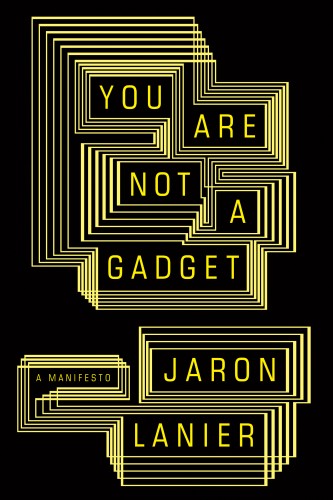Summer Reads: DiPeso on You Are Not a Gadget

The Internet has been touted as a paradise for individual liberty and democracy – a platform from which every point of view can be heard, a global town hall where the ideas of free individuals are the raw materials for the wisdom of the crowd.
Not so fast, says musician, virtual reality developer, and technology theorist Jaron Lanier in his book You Are Not a Gadget.
The Internet has spawned what he calls "digital Maoism:" a budding dystopia where the collective outweighs the individual, creative expression earns no reward for the creator, one's ideas disappear into a hive mind of wikis and banal mashups, and where town halls are raging mobs of predatory, anonymous trolls flaming insults and threats.
Lanier explores how digital culture is the consequence of design choices that produced technological lock-in. One example he offers is MIDI, a digital expression of music developed in 1980 that was oriented towards keyboards, locking out the more fluid tones that a vocalist or stringed instrument would produce. The result? MIDI is everywhere. As Lanier writes: “It is the lattice on which almost all the popular music you hear is built.”
The author’s concerns about digital trolls are especially relevant as we ponder why civilized debate has given way to polarized, hyper-partisanship. In his view, the digital cloud and social media have elevated the anonymous crowd over the individual, which can encourage mob behavior online. He writes: "The user interface designs that arise from the ideology of the computing cloud make people – all of us – less kind. Trolling is not a string of isolated incidents, but the status quo in the online world."
Lanier argues that the prevailing model in which created expression online is freely copied rather than paid for has served society poorly. "Right now, we get certain free cloud services in exchange for being spied on and not being paid, while still overpaying for bandwidth," he says in a Q&A afterword. Intriguingly, he argues that the "open/free" digital model has a larger carbon footprint than a model in which digital content would be purchased.
Lanier's contrarian critique of the online world centers on age-old questions of finding meaning and protecting one's dignity. As he says in the back-of-the-book Q&A: "The all-or-nothing conceit of the bit should not be amplified to become the social principle of the human world, even though that's the lazy thing to do from an engineering point of view. It's equally mistaken to build digital culture, which is gradually becoming all culture, on a foundation of anonymity or single-persona anti-privacy. Both are similar affronts to personhood."

